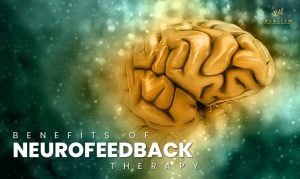
Are you looking for Neurofeedback therapy to help you achieve optimal brain function and improve your overall mental and physical health? Do you find traditional therapies ineffective, or are you concerned about the side effects of medications? Neurofeedback therapy may be an option worth exploring.
Neurofeedback therapy is a non-invasive, drug-free approach to improving brain function, gaining popularity recently. This blog post will explore the essential benefits of neurofeedback therapy and why it might be the right choice for you.
What is Neurofeedback Therapy?
Neurofeedback therapy is a type of biofeedback that uses sensors to monitor brainwave activity and provide feedback in real time. The input is given through visual or auditory cues, which help the patient to modify their brainwave activity to achieve optimal brain function. Neurofeedback therapy can be used to treat a variety of mental health conditions, including:
- Anxiety
- Stress
- Depression
- ADHD
- PTSD
- Sleep Disorders
- Autism Spectrum Disorder
- Insomnia
- Panic Attacks
- Seizures
- Traumatic Brain Injury
- Phobias
Benefits of Neurofeedback Therapy
- Improved Mental Health
One of the most significant benefits of neurofeedback therapy is improving mental health. Neurofeedback therapy is effective in reducing symptoms of anxiety and depression. Research has shown that neurofeedback therapy helps individuals learn to self-regulate their brain activity, which can reduce anxiety and depression symptoms.
In addition, neurofeedback therapy has been found to improve mood and cognitive function. A study published in 2022 tells the experience of neurofeedback therapists in treating people with ADHD – the study concludes that it helps improve ADHD symptoms and overall quality of life.
- Better Physical Health
Neurofeedback therapy can also lead to improvements in physical health. The treatment relieves chronic pain, reduces insomnia and sleep disorders, and reduces migraines and headaches.
This study tells that QEEG-guided neurofeedback helps reduce headache frequency in people with recurrent migraines. In addition, neurofeedback therapy effectively helps with pain management and reduces chronic pain in individuals with fibromyalgia and other chronic pain conditions.
- Improved Sleep
Another benefit of neurofeedback therapy is that it can improve sleep quality. By regulating brainwave activity, patients can learn to relax more easily and fall asleep faster. This can be particularly helpful for individuals with insomnia or other sleep disorders.
- Increased Self-Awareness
Another significant benefit of neurofeedback therapy is increased self-awareness. The treatment can help individuals better understand their thoughts and behaviors, increasing self-control and enhancing emotional regulation.
Neurofeedback therapy can also help individuals identify and change negative thought patterns and behaviors, improving relationships and overall quality of life.
- Enhanced Performance
Neurofeedback therapy has also been found to enhance performance in various areas of life. The treatment has improved academic, professional, and athletic performance.
- Safe and Non-Invasive Treatment
Neurofeedback therapy is a safe and non-invasive treatment option for individuals who want to improve their brain function and overall health. Unlike medication, neurofeedback therapy has no side effects, making it an ideal treatment option for individuals who cannot tolerate or prefer a non-invasive treatment approach.
Neurofeedback therapy does not require any special equipment or medication, and the therapy can be performed in the office of a neurofeedback therapist. The therapy is painless and does not involve any needles or invasive procedures.
Potential Side Effects of Neurofeedback Therapy
While the vast majority of people who undergo neurofeedback therapy experience no adverse effects, there is a possibility that some people might experience headaches, dizziness, nausea, fatigue, or irritability. These side effects are typically mild and resolve on their own. However, if you share any of these side effects, please contact your therapist so they can adjust the treatment accordingly.
- Headaches
- Dizziness
- Nausea
- Fatigue
- Muscle tension
- Insomnia
- Anxiety
- Depression
- Irritability
- Low Energy
How To Find Neurofeedback Therapists Near Me?
You can do a few things if you’re looking for neurofeedback therapists near you.
- First, check with your local mental health association or directory. This is an excellent way to find therapists experienced in neurofeedback and your area.
- Another option is to search online for “neurofeedback therapists near me.” This will give you a list of therapists who offer neurofeedback services. You can then read reviews and contact the therapist to see if they fit you.
- Finally, you can ask your friends or family if they know of good neurofeedback therapists near you. If you have someone you trust with experience with neurofeedback, they may be able to recommend a therapist.
With a little bit of research, you should be able to find a therapist who can help you with your needs.
Conclusion
Neurofeedback has many significant benefits, and it effectively reduces symptoms and improves functioning in those who receive it. If you or someone you know is struggling with a mental health condition, consider finding a neurofeedback therapist near you to see if this treatment could help.
Healizm can assist if you are looking for high-quality neurofeedback treatment.
Get help today to start feeling better tomorrow.
